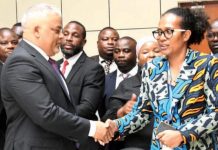
Africa-Press – Malawi. United States of America has been leading in democracy and this why it was key for Malawi Electoral Commission (MEC) Chairperson Dr Chifundo Kachale to be part of an International Elections observation delegation accredited by the State of Maryland Elections and DC Elections Board during its presidential election and vote counting and he has said they are many things to learn from the just-concluded polls.
He observed that despite the fact that President Donald Trump at a point ordered for the complete halt of the counting of the ballots, the institutions were independent and assertive.
Kachale, a judge at the High Court, said it was vital to strengthen institutions like the Electoral Commission, the Judiciary, the Legislature and those institutions that anchor Malawi’s democracy to offer the right service and mandate that the people had given them, without any partisan consideration.
The head of the electoral commission, who was accompanied on the trip to the US by commissioner Arthur Nanthuru from 1st to 11th November, has however said the country should consider the use of technology in achieving effective results management in the administration of elections.
He said the use of technology made it possible for many Americans to cast their votes electronically and made the process of vote counting so much quicker as the ballot is counted the moment it is cast.
“The issue of technology makes people able to cast their votes electronically which also makes the process of counting the votes so much quicker because the vote is counted at the moment it is cast and at the end of the day all you do is collect all the data and feed it into a machine and it gives you the tally of the votes, very efficient process .
“We may not go that route immediately, but I think it’s worth considering harnessing the capacity of our technology to facilitate the processes of casting votes and counting votes and therefore speeding up the results management processes,” he said.
“But on the actual election day, I think one of the pillars that stood out for me which I hope we can implement in our own context is the high-level civic participation by different professionals and other civic actors.
“Instead of people just criticising the robustness of the electoral process or systems, they actually get involved and are involved as polling staff on a voluntary basis,” he observed.
Kachale, who replaced the controversial Jane Ansah at the electoral body, and brilliantly navigated a combination of political and logistical obstacles, to deliver a credible fresh presidential elections in June, said there is room for creating more trust in the electoral systems through openness and transparency for people to understand the processes.
“In Malawi here we’re doing an election for only 18 million people while there, there were doing elections for over 158 million people; the timeframes and the systems may not exactly be directly comparable, but I think for me what’s important in the elections results management processes is that whatever you do whether it takes you one week or one month, people must have confidence in what you’re doing”.
Kachale’s political independence was critical to the elections being credible, yet this too is only part of the story. Malawi only held a “fresh” election in 2020 because first the Constitutional Court and later the Supreme Court ruled that the 2019 polls had been flawed. Indeed, the Courts went well beyond simply striking down former president Peter Mutharika’s victory, stipulating that victors in presidential elections must win 50%+1 of the vote, and setting out a timeframe for the fresh elections.
In turn, this decision did not come out of a vacuum, but was itself the product of a long history of institutional evolution in which judges who had previously acted to defend democracy and recent reforms had boosted their agency and confidence. The judges of the Constitutional Court even refused a large bribe from the ruling party .





